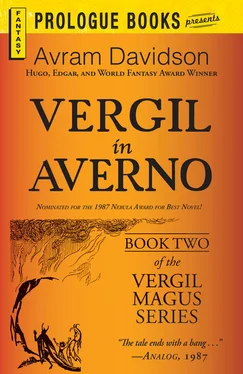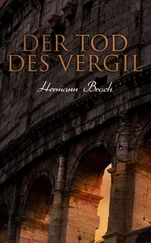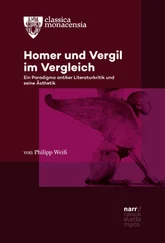Avram Davidson - Vergil in Averno
Здесь есть возможность читать онлайн «Avram Davidson - Vergil in Averno» весь текст электронной книги совершенно бесплатно (целиком полную версию без сокращений). В некоторых случаях можно слушать аудио, скачать через торрент в формате fb2 и присутствует краткое содержание. Жанр: Фэнтези, на английском языке. Описание произведения, (предисловие) а так же отзывы посетителей доступны на портале библиотеки ЛибКат.
- Название:Vergil in Averno
- Автор:
- Жанр:
- Год:неизвестен
- ISBN:нет данных
- Рейтинг книги:3 / 5. Голосов: 1
-
Избранное:Добавить в избранное
- Отзывы:
-
Ваша оценка:
- 60
- 1
- 2
- 3
- 4
- 5
Vergil in Averno: краткое содержание, описание и аннотация
Предлагаем к чтению аннотацию, описание, краткое содержание или предисловие (зависит от того, что написал сам автор книги «Vergil in Averno»). Если вы не нашли необходимую информацию о книге — напишите в комментариях, мы постараемся отыскать её.
Vergil in Averno — читать онлайн бесплатно полную книгу (весь текст) целиком
Ниже представлен текст книги, разбитый по страницам. Система сохранения места последней прочитанной страницы, позволяет с удобством читать онлайн бесплатно книгу «Vergil in Averno», без необходимости каждый раз заново искать на чём Вы остановились. Поставьте закладку, и сможете в любой момент перейти на страницу, на которой закончили чтение.
Интервал:
Закладка:
The two men gazed calmly at each other. They were of an age, about, and of a weight, about; save that Vergil was thick in the chest and slender in the legs and narrow in the loins. The other’s form was more of a symmetry, more equal in proportions. Outside in the colonnade a cresset flared, then dwindled. No one was there to replace it, but a few lamps burned in the room, and the room was not much dimmer now than in the daylight once the shutters were closed, for no thin-pared panels of horn, none of lucent shell nor of oiled cloth pierced their solid panels. Vergil: “Why?”
Armin scarce shrugged one shoulder, scarce twisted one side of his mouth. “Because it amused me. Ah, me Here! How it amused me! That is why I, too, hallooed loud Long Live King Cadmus! when they set the crown upon his curls. Nor did he disappoint me, that one. He has put bright tappeties — ‘tapestries,’ you call them — hanging on our black walls, and flung bright garlands round the necks of our black horses. And — you saw, you heard! — there in the open place where the black mules spilled their black piss and passed their black dung, he danced! Me Here, me Hercules! how he danced! What will you tell them when you go to Rome?”
The swift transition did not catch Vergil unprepared. He stroked his short beard, and, as it, too, was black, he wondered (passing-swift and wry the thought!) how it would look offset with flowers. “I? I do not go to Rome,” he said.
Armin looked at him, head a-cant, eye a-slant. “Ah? No? But, you know, you know. . Rome may come to you,” said he.
But though long later men were to speak both of what they called, fearfully and darkly, The Death of Rome (some said, one man; some said, three men; none could agree on the names of any), and to speak, brightly and cheerfully (some men, at any rate) of what they called The Salvation of Rome , describing this as a series of mirrors in or through which the Emperor might see, and in good time, the advance of any army of rebels or of alien invaders — that morning, that is, the morning next, Vergil for one saw in no mirror any sign or signs of Rome advancing toward him.
So he looked into his tablets to see what names the secretary of Haddadius had at his master’s whisper engraved therein.
The first name on the list was that of M. Cnaeus Grobi, and at that magnate’s gate the door was not even opened for Vergil at all, merely a slat slid back to disclose a peephole behind it (Grobi, it seemed, was even less trusting than the nephew of the blind jeweler!), and through this an eye looked at him. Vergil stated his purpose, the eye did not blink and the door did not move; he showed his tablets with their inscribed list, the eye moved a bit, and then the eye went away. Dignity be damned! Thus thinking, Vergil applied his own eye to the peephole’s other side: naught he saw but some screen or buffer standing or hanging back a way. . not much farther back, he thought, than to allow a man to stand between it and the gate. No more he saw; did he hear more?. . more than the usual clamor from the nasty street at the lane’s end? He heard something like a growl from deep within what might be the chest of a rather large dog. Sign, Cave canem, there was none; who came upon the canine came without having been forewarned, such warning being evidently here at least regarded as an indulgence not the least necessary. But, by and by, Vergil, having withdrawn his eye (he had applied it very briefly), by and by there came the sound of slow and heavy steps, and the sound of slow and heavy breathing. … I should like, at least for a moment, to listen closely to those lungs (thought Vergil) and to inform their owner what said Hippocrates and what said Galen and what said such a one and such a one: and to advise him … and then an eye again looked out at him through the chink in the door.
It was not the same eye.
The heavy breathing continued a moment, the slat slid shut, the heavy footsteps departed. Vergil waited and he paced, and he paced and he waited; but there was no further response from behind the heavy dark door (it seemed, though, that perhaps the dog behind its wall paced him on his side step for step), and presently he went away. Those lungs shall not long continue to labor breathing this thick, foul air, he thought. But he thought this without malice, and without particular pleasure. And he thought, too, that if this was the way one was treated in The Very Rich City, he might another time prefer to hazard his chances in silted-up Parva Porta, so proverbial for poverty; where, it was said, pigeon soup was made by boiling pigeon feathers, and the very dogs were so weak that they had to lean against the trees to bark.
Trees! He saw none here at all.
The doors, however, of the house of Lars Melanchthus opened wide enough, and wide they must needs open if Lars Melanchthus himself had to pass through, for Lars Melanchthus was a wide man indeed. “Ho, you are a wizard!” said he. “You are a wizard. You are a wizard?”
“Yes, Magnate.” Clearly this was no time to ask if they should first define their terms. Nor, for that matter, had Socrates had to define the bowl of hemlock.
“Ho,” said Lars Melanchthus. He gazed at Vergil with large and reddened eyes. The eyes seemed respectful. But they also seemed to hold a look of what might be called shrewdness. Particularly by Lars Melanchthus. Who now looked round about his table, then picked up one of those jointed figures of a skeleton, made of ebony and ivory, which were usually passed around the banquet-board after the finger bowl as a memento of man’s mortality. First he picked it up, then he set it down, well away from the reach of Vergil’s hands. “So, Wizard. Make it dance. Make it dance, Wizard, so.”
Was it for this —?
Vergil made it dance. He made it caper, tread on its toes, he made it fling its arms up, and he made it dance the classic dance of Attic grace. Magnate Melanchthus was delighted, clapped his huge hands, summoned sundry members of his household, gestured them to look at the jiggling anatomy, and joined in their amusement. And when, after a while, the dance of death slowed and the skeleton sank down and lay at full length in repose, the magnate announced his own conclusion. “Yes,” he said. “You are a wizard. Oh yes! Yes.”
The wizard bowed. In what audience of what school of enchantment the magnate had discovered this singular, though simple, test of wizardhood, Vergil would have liked to ask, but he forbore. Melanchthus snapped his fingers, gestured. The magnate’s butler approached and handed Vergil a new robe and a single coin. A silver ducat. “Those are for you,” said Lars Melanchthus. “For you, for you. So. Thank you.”
“On the contrary, Magnate, it is really for me to thank you.”
“Yes,” said the magnate. He nodded his acknowledgment, looked all around, gathered the nods of others. Then he said, “All right to go now, Wizard.”
And the wizard went.
Was it for this —?
Someone had told him this: that, traditionally, and where circumstance permitted, in the sundry workplaces among the fire-fields of Averno, the day’s work began with the Big Slave, be he owner or the chief workman, tossing a red coal at, seemingly, nowhere in particular; there followed a sound like a gasp (so it was described in the account), followed by a jet of fire. The Big Slave had known whereat he tossed, and his red coal had found some fumarole whose foul breath was no merely foul breath, but inflammable air, called gas.
It was not that Vergil would not have wished to see this happening (vaguely he recalled having heard that somewhere this was involved with a lump of incense: surely not here!), and see it happen he might yet: but not here, now, yet; the day’s work had long ago begun, and, by the sound, was in no way slackening. At the home (which he had next sought) of a listed magnate, they had without either civility or incivility sent him with some young house-thrall as guide through a long lane into the open area where, for the first time clear, he beheld the fire-fields being worked. He stood for a while merely looking, thinking, appraising, calculating. When he looked for his guide to ask a question, the guide was gone.
Читать дальшеИнтервал:
Закладка:
Похожие книги на «Vergil in Averno»
Представляем Вашему вниманию похожие книги на «Vergil in Averno» списком для выбора. Мы отобрали схожую по названию и смыслу литературу в надежде предоставить читателям больше вариантов отыскать новые, интересные, ещё непрочитанные произведения.
Обсуждение, отзывы о книге «Vergil in Averno» и просто собственные мнения читателей. Оставьте ваши комментарии, напишите, что Вы думаете о произведении, его смысле или главных героях. Укажите что конкретно понравилось, а что нет, и почему Вы так считаете.












